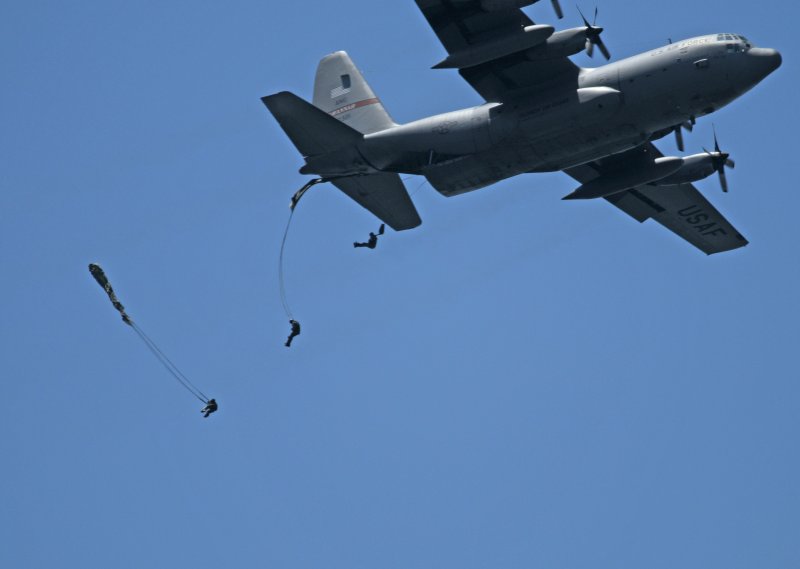Navy report: inadequate oversight, other risks at deadly SEALs training program

U.S. Navy SEALs jump out of an airplane with the aid of parachutes as part of a training exercise. Chief Special Warfare Operator Bradley S. Cavner died Wednesday when his parachute failed deploy during one such exercise. File photo courtesy the U.S. Navy
May 25 (UPI) -- The U.S. Navy has released a report that details inadequate oversight and other risks at the deadly training program for the Navy SEALs.
The 198-page redacted report was conducted by the Naval Education and Training Command into the Basic Underwater Demolition/Sea, Air and Land program, known as BUD/S, after the February 2022 death of seaman Kyle Mullen just after completing the program's Hell Week.
Hell Week consists of brutally difficult operations in cold, wet environments with candidates getting fewer than four hours of sleep.
Only around a quarter of trainees make it through the week, producing around 250 new SEALS each year. Less than 10% of Mullen's class completed training last year with 189 having quit or been injured by the time of his death.
Admiral William Lescher, the outgoing Vice Chief of Naval Operations, ordered the investigation to be conducted by a rear admiral from outside of the SEALs in September after Mullen's death.
"The high-risk training program conducted at BUD/S is necessary to achieve the required outcome: fully combat capable special operators," Rear Admiral Peter Garvin wrote in the document.
"Efforts to mitigate the inherent risk must not be allowed to dull training effectiveness and thereby create risk to commands and sailors operating in combat environments."
That said, Garvin revealed that the investigation found "failures across multiple systems" that led to a number of candidates being at a high risk of serious injury.
"At its core, the investigation finds that relentless and continuous self-assessment and self-correction within all departments of BTC is required," Garvin added.
Garvin called the situation at the training program a "perfect storm" of converging factors that led to increased risk for Navy sailors, including instructors who pushed their classes to exhaustion and the use of illegal performance-enhancing drugs among the ranks.
"Illicit [performance-enhancing drugs] use represents a significant hazard to candidate health, and is also contrary to the SEAL ethos and the Navy's core values," the report reads.
"This, as the investigation recommends, both a robust testing program to mitigate the risk to injury and an education program to build a culture of integrity and moral character must be implemented and sustained, as soon as scientifically and medically feasible, to eliminate [drug] use at BUD/S."
The investigation also found that instructors, during Mullen's class, had deviated from past practices to allow recovery time for the seamen, which left candidates "more fatigued and compromised."
During his training, Mullen was observed spitting out a bloody, brown-colored fluid and was administered oxygen before he continued training. He was later given more oxygen in a command ambulance for an hour and was later evaluated again with observed crackles in his lungs.
Nevertheless, Mullen was cleared to rest in the barracks to recover from Hell Week and further diagnostic testing was not ordered. Along with another seaman, Mullen was transported to the barracks by wheelchair as his respiratory issues worsened.
Eventually, those keeping watch over Mullen called 011 and Federal Fire Department paramedics performed CPR on him before transferring him to the nearest hospital, where he died.
The report found that at least 11 visits to medical clinics had been made in recent years for pneumonia, with another 112 BUD/Z candidates having been monitored for pneumonia or for swimming-induced pulmonary edemas.
The Navy has since made several changes to the course based on the findings in the report and reassigned eight sailors and officers for failing to perform their duties.
"While rigorous and intensely demanding, our training must be conducted with an unwavering commitment to safety and methodical precision," Rear Adm. Keith Davids, commander, Naval Special Warfare Command, said in a statement.
"Therefore, in the wake of the tragic loss of Seaman Kyle Mullen, we have taken decisive steps to improve our policies and standard operating procedures."
No comments:
Post a Comment